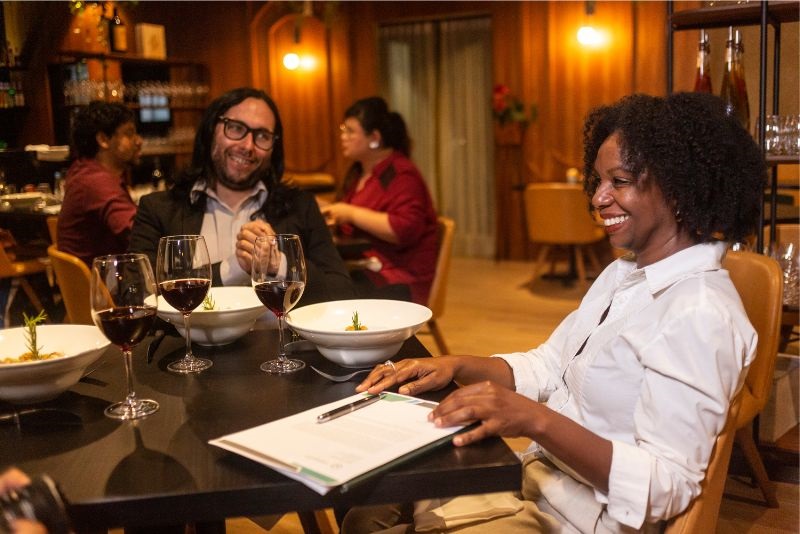With the RMFW 2023 Conference right around the corner, it’s time to think about one of the most important aspects of a gathering like this—networking! And not just with your fellow fiction writers but with industry professionals as well. You’ll have opportunities to pitch agents, ask questions of publishers, and listen in on panels with knowledgeable experts.
But it’s one thing to ask questions in a formal setting like a lecture or panel discussion. It’s quite another to feel comfortable engaging in casual conversation with these professionals in a non-formal setting. How many of you have stood waiting to order a glass of wine, only to realize your dream agent is right behind you in line? Or you’ve grabbed the last seat at a table and a major publishing guru is seated beside you?
This type of spontaneous meeting can be a great way to build a connection but at the same time it can backfire if you either behave in an intrusive and entitled way or conversely, are tongue-tied and fumbling for something to say. Let’s look at some conversation starters for when you spot a person you’d like to connect to but aren’t entirely sure how to proceed.
First of all, take a deep breath and relax. This is just a person, not a god and not a dragon. They want to be treated like a human being. The key to engaging them is to be genuine, attentive, and enthusiastic. Listen more than you talk, ask intelligent follow-up questions, and concentrate on them, not you. This is your chance to learn what the book world looks like from the perspective of an agent or publisher. Take advantage of it.
Let’s look at some possible conversation starters:
1. Conversation Openers
– Hi. We haven’t met, but I listened to your presentation today and found myself nodding along when you talked about ____________ (fill in the blank).
– How long have you worked in publishing?
– How did you get started as an agent?**
2. Asking them about their day-to-day work
– What kind of manuscripts are you getting these days that catch your interest?
– What are some exciting trends you see happening in the industry lately? I’m curious to hear your insights.
– What are the most common mistakes authors make when they query you?
– What genres do you like representing the most? (and follow-up with “why?”)
3. Share your writing challenges & ask for their advice
– I find balancing dialogue and narrative is tough. What do you think makes a good flow?
– I struggle finding new readers – What’s the best marketing move you’ve seen your authors use to successfully promote their books?
– I’ve been revising my manuscript for a while now. Any tips about how to tell when it’s ready to be submitted?
– If you get an inquiry from someone who’s only self-published before, is that a negative or a positive for you?
– How important is an author’s social media platform to you?
4. Their insights into the publishing industry
– I’ve been reading about the rise of serialization. What’s your take on this?
– I’ve heard publishers are interested in shorter books these days. Are you finding that’s true?
. Are there any specific genres or niches in publishing that you think are under-represented right now?
– What trends or technologies do you think authors should be paying attention to?
5. How is AI going to affect publishing (this is a VERY hot topic right now)
– What are your thoughts on how AI might influence the future of writing and publishing?”
– Have any of your authors had direct issues with AI-generated content?
– Mention a current news story you read ie. Jane Friedman’s issues with a book uploaded to Amazon with her name on it.
– Do you or your fellow agents see ways AI can help automate some of your tasks so you’re not so swamped with submissions? Are you hearing about publishers using AI to help with workflow?
– As a literary agent, do you see any opportunities for collaboration between writers and AI technologies, rather than seeing them as competition?”
– Do you see any positives to AI generated content or is it all negative?
6. Sharing origin stories/ inspirational stories
– What themes or styles do you think resonate the most with readers nowadays?
– Do you think incorporating personal experiences into fiction is a good idea or is it a turn-off to readers?
7. Lighter topics
– Have you ever thought about writing a book yourself?
– What’s the last great debut you read that you wished you’d represented?
8. Getting Personal
– Apart from reading and working with authors, what are your other passions?
– What’s the most rewarding part of being a literary agent for you?
– In your opinion, what qualities or practices set successful authors apart from those who may struggle to gain traction?
9. Expressing Appreciation
– It’s been delightful chatting with you. Thanks so much for sharing your insights with me.
Remember this is NOT the time to make a pitch for representation or other favor. If they give you their business card, write a brief follow-up email again expressing how much you enjoyed meeting them and perhaps how you might reciprocate (suggesting them for a speaking engagement, recommending them to a friend, reviewing one of their author’s books).
** for purposes of this blog, I’ve used “agent “for the industry professional you’ve encountered. But it could just as easily be a publisher, a PR guru, a cover designer, or a developmental editor.

